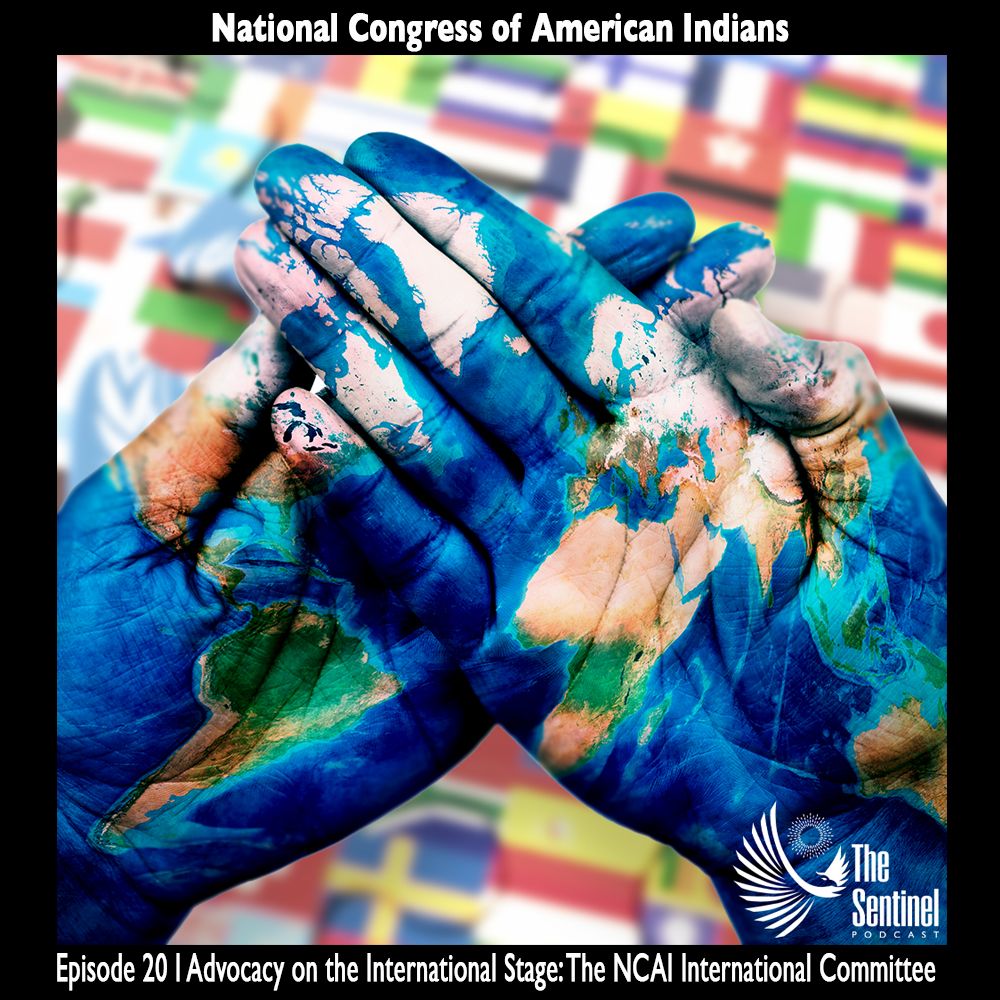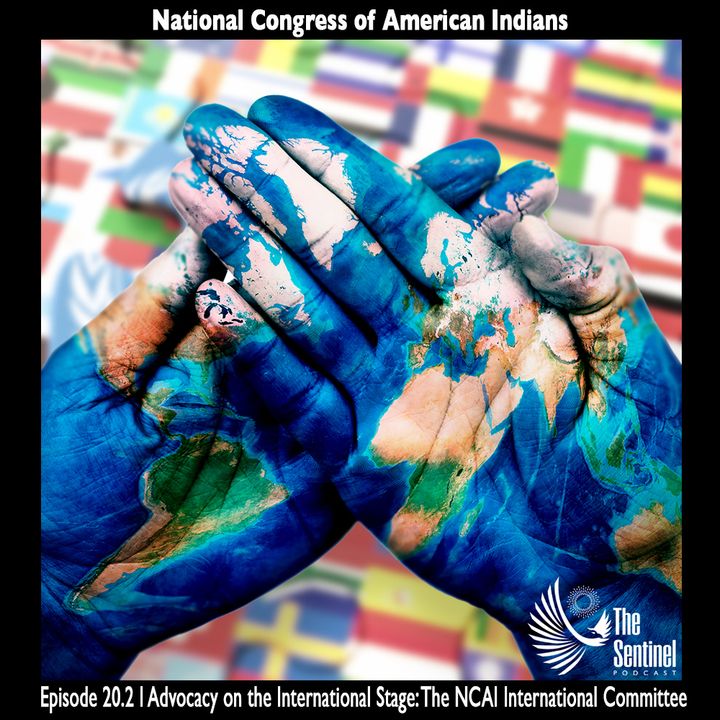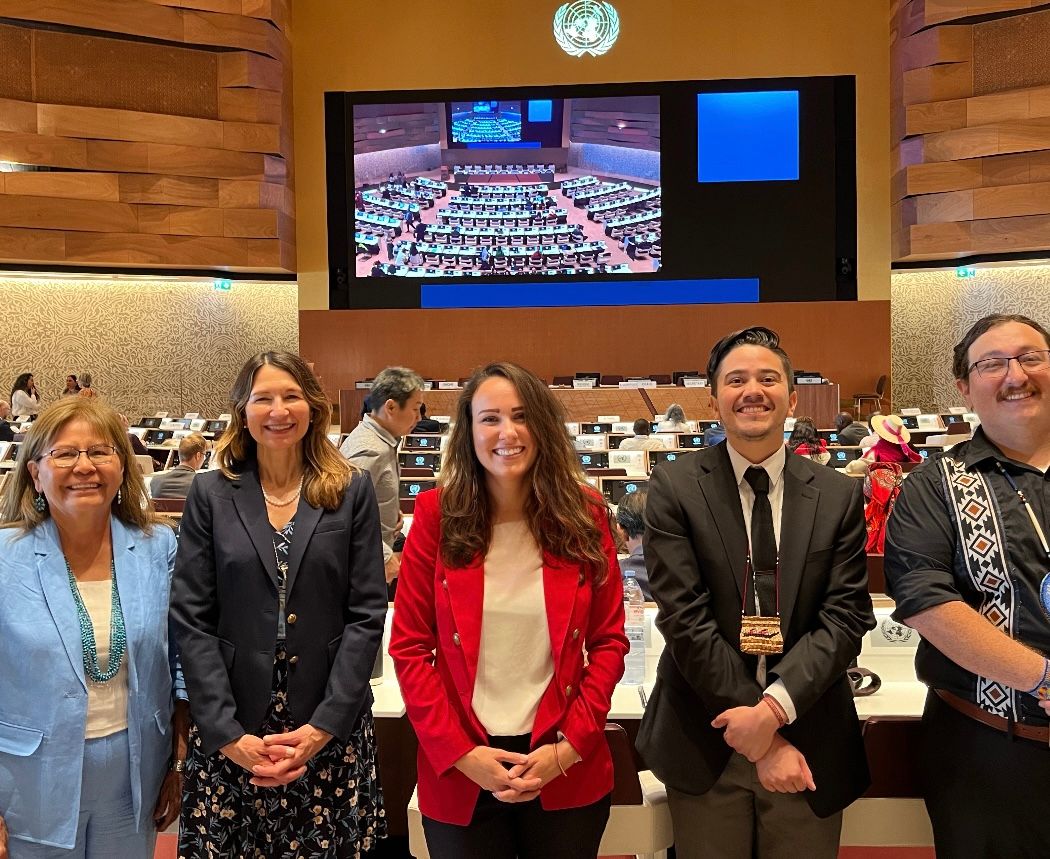International Advocacy
About
NCAI recognizes that the realization of tribal sovereignty requires the full representation and engagement of Indigenous Peoples as equals at all levels of the decision making process—including the international level. The adoption of the United Nations Declaration on the Rights of Indigenous Peoples (UNDRIP) in 2007 not only marked a significant acknowledgment of Indigenous Peoples and their rights worldwide, but created opportunities for more action by Tribal Nations in the international sphere. Partially in response to the UNDRIP, in recent years, NCAI has prioritized negotiations at the United Nations (UN) and the Organization of American States (OAS), engaging in a number of substantive policy discussions of particular concern to Indigenous Peoples, including climate change, the protection of Indigenous traditional knowledge and genetic resources, and enhanced participation within international decision making forums. NCAI remains firm in its commitment to enabling “the participation of Indigenous governments and peoples on a regular and permanent basis in the UN,” and remains steadfast in its responsibility to uphold the right of Indigenous Peoples to exercise their inherent right to self-determination.
The Sentinel Podcast
Advocacy on the International Stage: The NCAI International Committee

Episode 20 | Part 1
In this episode of The Sentinel, we explore NCAI’s commitment to international advocacy work. NCAI has recognized that its mission of promoting tribal sovereignty must extend beyond the borders of the United States and include the representation, participation and voices of Indigenous Peoples on a global stage.
Join us for a thought-provoking discussion led by Rochelle Morgan-Verdin, NCAI’s Policy Lead for International Issues and citizen of the United Houma Nation, the Co-Chairs of the recently formed NCAI International Committee, and key experts who have advocated for these issues for decades. Our listeners will hear from guests who are all steadfast advocates representing NCAI at international fora, carrying forth the organization’s mission globally.

Episode 20 | Part 2
Part two continues our exploration of NCAI’s international advocacy work and examines further how NCAI’s advocacy for Indigenous Peoples on the global stage ties into its larger mission of promoting tribal sovereignty.
In this expanded conversation led by Rochelle Morgan-Verdin, NCAI’s Policy Lead for International Issues and citizen of the United Houma Nation, we hear from two additional experts who have been deeply involved in the organization’s advocacy for decades. They shed light on the history of NCAI’s international work, what progress is being made today, and what we can expect in the years to come.
Expert Mechanism on the Rights of Indigenous Peoples (EMRIP)
The 18th session of the Expert Mechanism will be held in person from July 14 to 18, 2025, in Geneva, Switzerland.
Established in 2007 by the UN Human Rights Council, EMRIP provides expert advice and research-based recommendations to promote and protect Indigenous rights under the UN Declaration on the Rights of Indigenous Peoples (UNDRIP).
Each year, a five-day gathering occurs with representatives from states, Indigenous Peoples, Indigenous Peoples' organizations, civil society, inter-governmental organizations, and academia.
At the 17th session in 2024, Rochelle Morgan-Verdin, NCAI's Policy Lead for International Affairs, delivered two joint interventions on behalf of NCAI and the Native American Rights Fund (NARF) regarding matters of critical importance to NCAI's tribal membership.

Linda Benally (Dinè Nation); Sue Noe, NARF; Rochelle Morgan-Verdin (United Houma Nation), NCAI; Aaron Jones (Tulalip Tribes), NCAI International Committee Co-Chair; and Emiliano "Milo" Salazar, University of Colorado Law School (July 2024)
United Nations Permanent Forum on Indigenous Issues (UNPFII)
The 24th session of the UNPFII will be held in person from April 21 to May 2, 2025, at the UN Headquarters in New York. The theme is, "Implementing the United Nations Declaration on the Rights of Indigenous Peoples within United Nations Member States and the United Nations system, including identifying good practices and addressing challenges."

Rochelle Morgan-Verdin (United Houma Nation), NCAI, delivers an intervention advocating for legal protections of Tribal Nations' genetic resources and traditional knowledge within the intellectual property system. (April 2024)
UNPFII is an advisory body established in 2000, with the mandate to discuss and address indigenous issues related to economic and social development, culture, environment, education, health, and human rights. It consists of 16 independent experts — half nominated by governments and half by Indigenous organizations — and meets annually for 10 days at the UN headquarters in New York.
UNPFII provides expert advice and recommendations on Indigenous issues to UN system, including the Economic and Social Council (ECOSOC), as well as to various UN programs, funds, and agencies.
Specifically, the UNPFII works to raise awareness of Indigenous issues, foster the integration and coordination of related activities within the UN system, and ensure that Indigenous rights are fully respected. The UNPFII also prepares and disseminates information on Indigenous matters and monitors the effectiveness of the UN Declaration on the Rights of Indigenous Peoples (UNDRIP), advocating for its full implementation across the UN system.



NCAI had a strong presence at the 23rd Session of the United Nations Permanent Forum on Indigenous Issues, held April 15-26, 2024, in New York City. This session marked an unprecedented moment with one of the largest gatherings to date of elected U.S. tribal leaders at the UNPFII. This growing presence of tribal leadership highlights significant strides made toward enhancing Indigenous self-determination and global diplomacy.
UN Conference of Parties (COP)
The next United Nations Framework Convention on Climate Change (UNFCCC) Conference of the Parties (COP30), also known as the UN Climate Change Conference, will be held in person from November 10 to November 21, 2025, in Belém, Brazil. This conference will bring together global leaders, negotiators, and stakeholders to address urgent climate change issues and work toward international solutions for mitigating and adapting to climate impacts.

Policy Documents
COP 21 IP Closing Statement from NCAI
NCAI Written Statement UNDRIP 2012
UNPFII Wrap Up Report
Download the Wrap Up report of NCAI's work in conjunction with NARF and the University of Colorado Law during the 2024 United Nations Permanent Forum on Indigenous Issues. This historic session, held April 15-26, 2024, in New York City, saw a remarkable gathering of U.S. tribal leaders and Indigenous youth, highlighting significant progress in advancing Indigenous self-determination and global diplomacy.
